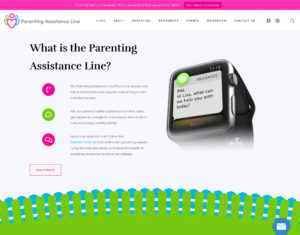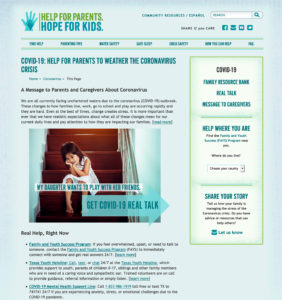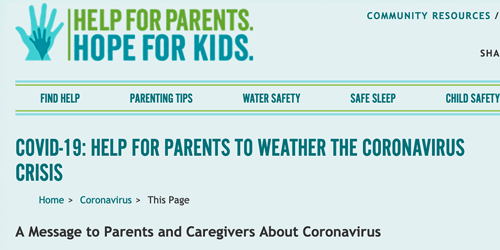State Children’s Trust Funds (CTFs) and their partners across the country have helped families weather the pandemic storm together. The challenges have been daunting, and families that never thought they would need assistance were asking for help, often from community-based services such as family resource centers. The COVID-19 pandemic has created a common denominator of stress and challenge for most families. It has created new risk factors and heightened existing ones. Following are some examples of ways that the CTF prevention system supported families during this time.
West Virginia
In West Virginia and in other places throughout the country, Family Resource Centers (FRCs) are providing concrete support for families in times of need. Local community-based organizations and FRCs are providing diapers, hygiene products, specific types of formula, pack and plays, etc. These programs, which are funded by the West Virginia Children’s Trust Fund, are using “porch drop-offs” and have created satellite locations and mobile units for distribution of food and other basic necessities in a safe manner.
- An FRC in Tucker County, WV commented: “Families need to be able to access resources and services in one location, not have to find a ride to go to 7 places over the course of half a day and 15 miles to try to go to a food pantry, baby pantry, diaper pantry, and get help with a resume.”
Missouri
In Missouri, the Children’s Trust Fund (CTF) is helping programs that have had a loss of funding because of COVID-19 and are operating in environments that are economically challenged. For example, one of their grantees is called Whole Kids Outreach, and is located in one of the most rural and isolated areas in Missouri. There is no fundraising base in this community, yet Whole Kids Outreach operates a home visiting program (Heathy Families America) that is as impactful as any program their CTF Director has ever seen. It is run by a nun, Sister Anne Francioni, and she is a force of nature. But they struggle to meet payroll and other needs even in the best of times. The CTF has approved a grant for them because they had to cancel their biggest fundraiser that was scheduled for Friday. They hold that fundraiser in St. Louis even though that is more than 200 miles from where they are located because they can’t hold a high dollar fundraiser in the middle of Mark Twain National Forest.
Massachusetts
These needs are not just limited to lower income families. On Martha’s Vineyard, they experienced food shortages as families with summer homes crowded on to the island to quarantine. The Massachusetts Children’s Trust worked with local programs to be able to bill the children’s trust for the diapers, formula and other items that they purchased for families. Then these items were packaged with parenting tips and items to help the children in their learning and were most often dropped off on the porches of the families involved.
 Alabama
Alabama
The employees and community programs at the Alabama Department of Child Abuse & Neglect Prevention, which includes the Children Trust Fund, are continuing to stay in touch with vulnerable children and families through creative ways. The Parenting Assistance Line (PAL) is funded by the department and has become a valuable resource for caregivers during this difficult time. This “warm line” provides families with access to a parent specialist who can assist in responding to questions and providing resources to help moms, dads, grandparents, caregivers or anyone wanting to nurture a happy, healthy family. Family members can speak with a specialist about questions concerning children from birth to adolescence. Caregivers needing assistance can call, text or visit the website.
 Texas
Texas
The Texas Children’s Trust Fund, which is part of the Department of Family and Protective Services, developed a new web site specific to supporting parents during COVID-19 called Help for Parents. Hope for Kids.
Idaho
The Idaho Children’s Trust Fund developed a new Facebook group devoted to Resilience (Idaho Resilience Project) during this time of COVID-19. Useful information is shared and a sense of community has been growing among participants. Membership is open and anyone can join. What began as a resource for Idaho parents has become available to parents across the country.

